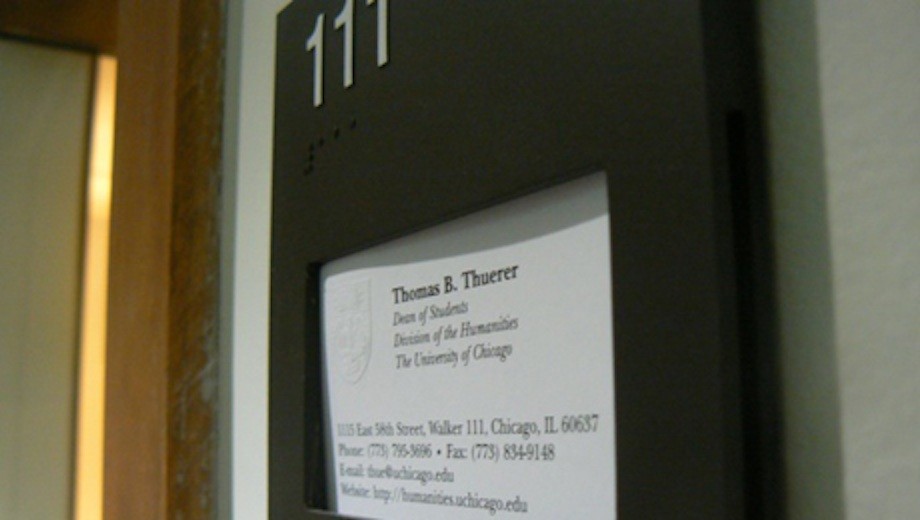FOR GENERATIONS OF Humanities graduate students, Tom Thuerer’s door was always open—whether they needed a change of registration, an emergency student loan, or a word of advice from someone who had once been in their shoes. Thuerer, AM’75, began his University of Chicago career as a graduate student in the Divinity School, where he earned his master’s degree and worked on his doctorate. From the Divinity School he moved to administrative positions at the Center for Middle Eastern Studies and in the English Department before becoming Humanities dean of students in 1990.
After 21 years overseeing student affairs in the division, Thuerer retired this past February. He stepped down from his duties much as he’d pursued them: with little fanfare, declining a party in his honor but bidding quiet goodbyes to the students and colleagues who flooded his office as his last day approached. Martina Munsters, previously deputy dean of students for the University, was named his successor.
Thuerer played a central role in revamping graduate student recruitment and funding, both through service on University committees and on-the-ground work with departments. He helped bring Humanities admissions and registration into the digital age—each process is now close to being all-electronic.
Those who know him best say Thuerer’s greatest impact was on hundreds of individual students whom he knew personally and whose progress through their academic programs mattered to him. “The students knew the difference he made in getting them through their programs and into great jobs,” says James Conant, philosophy professor and chair. “And that’s what the job was about for him. It moved him to see students succeed.”
If students and alumni valued Thuerer’s approachability and commitment to their education, department staff and faculty members relied on his exhaustive knowledge of divisional history and University policies. "It moved him to see students succeed."For Miranda Swanson, AM’01, an associate dean of students who worked closely with Thuerer for a decade, the key to his success was balancing his responsibilities to students with those to the University. “He advocated for students whenever it was appropriate for the student and for the institution,” she says.
[wysiwyg_field contenteditable="false" wf_deltas="0" wf_field="field_article_images" wf_formatter="image" wf_settings-image_link="" wf_settings-image_style="" wf_cache="1363373444" wf_entity_id="4907" wf_entity_type="node"]
Conant agrees. “Tom always kept track of the spirit of the rules,” he says. “If a faculty member or a student came to him with an exception, he either convinced you that it shouldn’t be an exception, or you convinced him and he granted it. He brought reason to the job. He was my paradigm of the university administrator—the Platonic form.” Kathy Holmes, administrative assistant for the music department, adds, “He was committed to every student who walked through his door. In a nutshell, Tom brought humanity to the dean of students’ office in the Humanities.”
Thuerer’s nuanced approach to applying policy to individuals in diverse circumstances and his grasp of the student experience put him in demand on many campus committees, says Swanson. Don Fette, a doctoral student in comparative literature, worked with Thuerer on the Humanities Division Graduate Student Council. The Council distributes the divisional funds designated for student life each year—for sherry hours and other social activities intended to build community. “Tom was unwavering in his enthusiasm and dedication to ensuring that the process was fair,” he recalls, “and that the Council really impacted the quality of life of students.”
Thuerer also represented the division on a number of University-wide bodies that helped shape graduate study at Chicago. These includes the Provost’s Committee on Advanced Residence and Time-to-Degree and the Working Group for Student Life in the Social Sciences, Humanities, and Divinity School. In addition, notes Swanson, he was often asked to serve on staff hiring committees, in and beyond the Humanities Division.
Munsters, the new dean of students, says, “Over the many years that I worked with Tom, his guidance, advice, and support were always considered and thoughtful, and founded in a deep understanding of the University.”
Thuerer is spending the first days of his retirement “doing whatever he feels like,” according to Swanson. That includes weekday breakfasts at Yolk, a favorite neighborhood spot, cycling on the lakefront, and rereading the classics on a newly acquired Kindle. His gain is the division’s loss.

